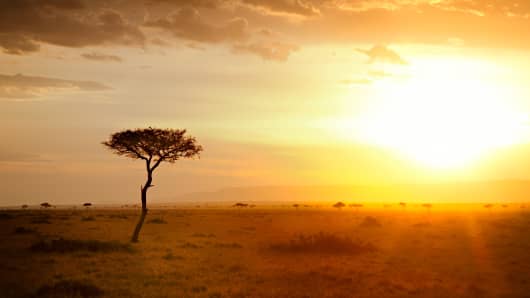We love the international side of this business. Here's a great story which tracks the sun's incredible ability to bring energy to the most demanding terrain. You can imagine the quality of life changes, the new jobs, expanded economy, that these energy systems will bring developing regions.
The sun cools Sub-Saharan Africa
Anmar Frangoul
At the moment, one in seven people in the world have no access to electricity to help them cook, keep food fresh and learn, according to figures from the International Energy Agency. And the vast majority of those off the grid live in sub-Saharan Africa and developing regions of Asia.
Solar Kiosk is a Berlin-based company looking to change the lives of people living without access to mains electricity. According to the company's website, its Solar Kiosk E-Hubb, "serves as a complete energy and business outlet for solar products, fast-moving consumer goods, and energy services."
The Solar Kiosk E-Hubb uses solar energy to provide off-grid communities with a range of services from charging their phones to purchasing perishable goods and cold drinks. As well as serving the community, the Solar Kiosk E-Hubb also offers opportunities to local businesses as franchise partners.
Andreas Spiess is the CEO of Solar Kiosk. On a film on the company's website, he outlines their philosophy. "When you fly over Africa at night it's a dark place, there's no electricity, there's no light, and that's an absurdity because during the day it's the brightest place that you can possibly think of, with so much sunlight," he said.
Solar Kiosk is a Berlin-based company looking to change the lives of people living without access to mains electricity. According to the company's website, its Solar Kiosk E-Hubb, "serves as a complete energy and business outlet for solar products, fast-moving consumer goods, and energy services."
The Solar Kiosk E-Hubb uses solar energy to provide off-grid communities with a range of services from charging their phones to purchasing perishable goods and cold drinks. As well as serving the community, the Solar Kiosk E-Hubb also offers opportunities to local businesses as franchise partners.
Andreas Spiess is the CEO of Solar Kiosk. On a film on the company's website, he outlines their philosophy. "When you fly over Africa at night it's a dark place, there's no electricity, there's no light, and that's an absurdity because during the day it's the brightest place that you can possibly think of, with so much sunlight," he said.
"So what we want to do is we want to capture the sunlight, transform it into energy and bring electricity and light at night to rural Africa," Spiess added.
Like many countries in Sub-Saharan Africa, getting access to electricity in Kenya is a huge problem for many people living there. For Patina, a salesperson living in Ol'Kiramatian, in Kenya's Rift Valley, the Solar Kiosk has had a big impact.
"We used to travel long distances – like 7-8km – to get to a place to charge a phone," she told CNBC's Sustainable Energy. "You'd try to charge it, but it wouldn't fully be charged, so you'd have to leave it to the next day… the solar kiosk has shortened the distances."
Hamis Balito is a self-employed resident of Ol'Kiramatian. "We can find perishable goods in the Solar Kiosk as compared to initially [when] we could not… find such commodities," he said.
According to the website of Solar Kiosk, there are currently 45 E-Hubbs in use across 10 countries, producing 120,750 kilowatt hours of energy every year.
Rachna Patel is the Managing Director for Solar Kiosk Kenya. "Already we have subsidiary organisations established in Ghana, Ethiopia, Rwanda, Tanzania… and we also have operations in Botswana," she said.
Like many countries in Sub-Saharan Africa, getting access to electricity in Kenya is a huge problem for many people living there. For Patina, a salesperson living in Ol'Kiramatian, in Kenya's Rift Valley, the Solar Kiosk has had a big impact.
"We used to travel long distances – like 7-8km – to get to a place to charge a phone," she told CNBC's Sustainable Energy. "You'd try to charge it, but it wouldn't fully be charged, so you'd have to leave it to the next day… the solar kiosk has shortened the distances."
Hamis Balito is a self-employed resident of Ol'Kiramatian. "We can find perishable goods in the Solar Kiosk as compared to initially [when] we could not… find such commodities," he said.
According to the website of Solar Kiosk, there are currently 45 E-Hubbs in use across 10 countries, producing 120,750 kilowatt hours of energy every year.
Rachna Patel is the Managing Director for Solar Kiosk Kenya. "Already we have subsidiary organisations established in Ghana, Ethiopia, Rwanda, Tanzania… and we also have operations in Botswana," she said.


No comments:
Post a Comment